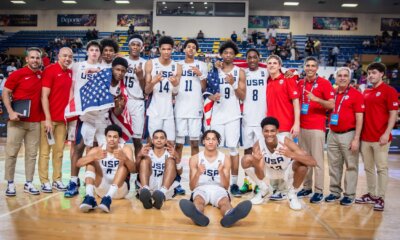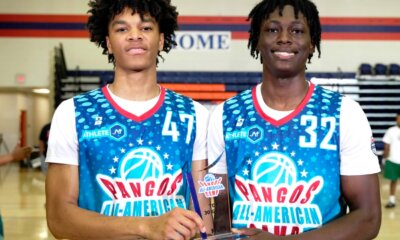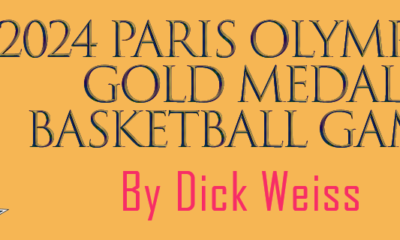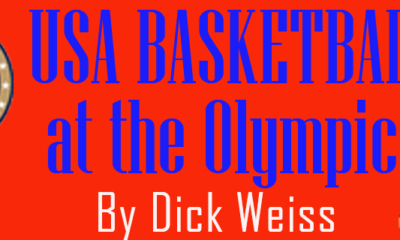BARCELONA, Spain– FIBA has an innovative blueprint on the table to create a new format for the World Cup of Basketball that would eventually make it the biggest and international competition in the history of the sport.
The international governing body for basketball is seriously discussing moving the next World Cup for basketball back a year from 2018 to 2019 so it would not conflict with futball’s World Cup on the calendar and expanding the tournament to 32 teams and using it as an Olympic qualifier. The first eight teams and the host country receiving automatic bids to the 12-team 2020 tournament at the summer games in Toyko. The second eight teams would then hold an additional qualifier for the three other spots.
If FIBA votes to go forward with this plan, the most likely location for the 2019 World Cup would be China, which would help FIBA grow the sport in basketball crazed Asia.
There are reportedly also plans in the works to pair with the NBA, which would share in the revenue, to make every attempt to insure the the best players from the league and all the best countries participate in the World Cup, then eventually relegating the Olympics to a 23-and-under event for younger stars.
While this year’s event has been well organized and there are 45 current NBA players participating, there have been a number of marquee no shows like Kevin Durant and Kevin Love, Blake Griffin and Paul George of the United States, Tony Parker of France, Manu Ginobli of Argentina, Andrew Bogut of Australia who withdrew for various reasons ranging from injuries contract negotiations and overall fatigue after a long NBA season. The competition itself is down from 2006, when Greece upset a United States team with a young LeBron James in the semis, then lost to Spain on the gold medal game. the World Cup is also missing prominent countries like Canada, which went belly up in the Americas qualifier and both China and Russia, which were offered wild card spots for $1 million apiece but declined to participate because they didn’t feel they could field a competitive team.
In the past, basketball fans in the United States have always viewed the Olympic summer games as the holy grail of international competitions, primarily because U.S.A basketball has sent the bulk of its elite players there since 2008. But FIBA has a chance to change that and increase Neilsen ratings by making the World Cup the only international event available to NBA stars in their prime.
Like futball, countries would advance to the World Cup through zone qualifying tournaments. There would be six qualifying windows for the 2019 World Cup that will be staged in November 2017, February 2018, June 2018, September 2018, November 2018 and February 2019. Four of the windows take place at the same time that the NBA schedule calls for NBA players to play NBA games. FIBA Secretary General Patrick Bauman is hopeful teams would allow their players to participate in the early rounds, particularly those that are held in June and September. But that seems unlikely because the NBA finals take place in June and training camp starts at the end of September, giving the countries with the biggest talent pools a huge advantage over smaller countries that might have one professional player.
USA basketball would have to use either development league players or elite college teams in the early rounds since it is unlikely the NBA, unlike futball or the NFL, will have any international breaks in its schedule so NBA stars couild beat up on countries like Latin American or Central American competition.
Here’s a list of the current NBA players on World Cup rosters.
Argentina– Luis Scola (Pacers), Pablo Progioni (Knicks).
Australia- Cameron Barstow (Bulls), Matthew Dellavedova (Cavaliers), Dante Exum (Jazz), brock Motum (Jazz).
Brazil– Anderson Varejob (Cavs), Tiago Splitter (Spurs), Nene (Wizards).
Croatia– Bojan Bodgdanovic (Brooklyn Nets), Damjan Rudez (Pacers).
Dominican Republic– Francisco Garcia (Rockets).
Finland — Erik Murphy (Cavaliers).
France– Nicolas Bantum (Trail Blazers), Boris Diaw (Spurs), Rudy Gobert (Jazz).
Greece Kostas Papanikulaou (‘Rockets), Nick Calates (Grizzlies), Giannis Antetokounmpo (Bucks).
Lithuana — Donatas Mtiejunas (Rockets), Jonas Valanciunas (Raptors).
Mexico — Jorge Gutierrez (Nets).
Puerto Rico– JJ Barea (Timberwolves).
Senegal– Gorgui Dieng (Timberwolves).
Slovenia– Goran Dragic (Suns).
Spain– Pau Gasol (Bulls), Marc Gasol (Grizzlies), Ricky Rubio (Timberwolves), Jose Calderon (Knicks), Serge ibaka (Oklahoma City), Victor Claver (Trail Blazers).
Turkey– Omar Asik (Pelicans).
United States– Mason Plumlee (Nets), Kyrie Irving (Cavaliers), Anthony Davis (Pelicans), James Harden (Houston), Kenneth Faried, (Nuggets), Andre Drummond (Pistons), Stephen Curry and Klay Thompson (golden State), DeMarcus Cousins and Rudy Gay (Kings), Demar DeRozan (Raptors), Derrick Rose (Bulls).















